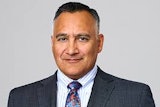Apathy towards coursework. Declining grades. Angry outbursts in class. One in five veterans of the Iraq and Afghanistan war suffers from post-traumatic stress disorder. But as many return home and stream onto college campuses, they enter a system ill-prepared to deal with them.
Professors concerned about students with PTSD spoke out and searched for ideas at an emotional hourlong session at this week’s National Institute for Staff and Organizational Development (NISOD) conference in Austin, Texas. The NISOD conference is one of the largest gatherings of community college professors, and is part of the Community College Leadership Program at the University of Texas at Austin.
Although there are no figures on veterans’ enrollment in community colleges, hundreds of thousands partake in the Montgomery GI Bill, and many professors at the conference said they have had at least one veteran soldier in their class as a student.
“He was a straight A student, and then one day he had a complete meltdown,” said Brandie Faulkner, assistant professor of Mathematics at Tallahassee Community College, of one of her students who had served in Iraq. Faulkner’s father served in the military. “They need help,” she said.
Many colleges have health clinics or nearby veterans affairs officers, but attendees roundly agreed that colleges should organize support groups, or hire a trained professional on campus.
Last October, the Veterans Affairs office reported that 430,000 U.S. soldiers had been discharged from the military following service in Afghanistan and Iraq. More than 119,000 of them reported medical or mental health issues to the office. PTSD is often referred to as a “sleeping giant,” because the majority of sufferers don’t seek help. A 2003 New England Journal of Medicine study found that more than 60 percent of veterans showing signs of PTSD said they were unlikely to seek help “due to fears of stigmatization or loss of career advancement opportunities”.
As the ongoing insurgencies in Iraq and Afghanistan continues, so does the likelihood that a soldier will be being exposed to violence, lose a comrade or inflict violence against another person — all actions that contribute greatly to PTSD.
The effect of the war on community colleges is still unclear because many soldiers are still at war. Upon their return from the battlefield, veterans can receive up to three years of paid college tuition through the Montgomery GI Bill, as long as they have a high school degree and an honorable discharge.
In 2002, more than 300,000 veterans had received such benefits. That number is expected to swell in coming years as soldiers return from Iraq and Afghanistan.
Post-traumatic stress is defined as “an enduring psychological disturbance attributed to the experience of a major traumatic event.” Studies show that many veterans feel suspicious and untrusting after enduring months and months on high vigilance patrols. Many suffer from guilt over returning to their community and enjoying life when their comrades died in combat. Others feel overwhelmed by the minutia of day-to-day life after months shouldering responsibility in a hostile environment.
Dr. Lisa Garner, an assistant professor of psychology at Tallahassee Community College said PTSD often manifests in the classroom as poor concentration, absenteeism or anger.
“What can we, as educators, do for these students and what can be done at the institutional level?” Gamer asked.
— By Christina Asquith
© Copyright 2005 by DiverseEducation.com















